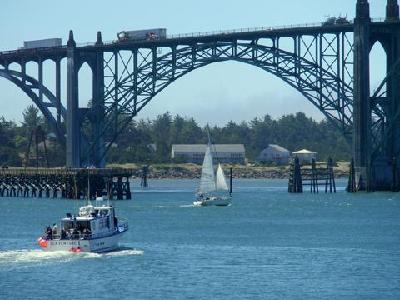
Two new science studies provide a glimpse of how some popular sea creatures could adapt to a changing climate.
One study describes how gray whales successfully adapted to previous cycles of global warming and cooling. The second predicts a fish shift on the west coast of North America. It suggests West Coast fishermen will need to adapt to different prey if the Pacific Ocean warms as projected over the next 50 years.
Nick Pyenson claims he has the best job in the world. This paleobiologist curates the marine fossil collection at the Smithsonian's Natural History Museum in Washington, DC. The famous collection includes lots of creatures driven to extinction by environmental changes. It also includes some of the long fossil record for gray whales, a species that still lives in the Pacific Ocean today.
"And grey whales fit into this question about ongoing climate change," Pyenson and his former doctoral advisor from UC Berkeley wondered how gray whales survived through previous cycles of global warming and cooling.
"So, in the past two million years, the Northern Hemisphere has undergone dramatic changes with ice sheets going all the way down to Chicago and Seattle, and in doing so, that sucks up a lot of the water that would be otherwise be put in the ocean and drops sea level dramatically."
Pyenson says historic sea level changes periodically expanded and closed off vast feeding grounds. He theorizes gray whales hung on through bad times by migrating less, or switching food sources or both. Even today, there are small numbers of gray whales that stay in one place and eat fish and krill, while most of their species migrate long distances and bottom feed.
"What we think is telling is that those who don't migrate are telling us about the range in behavior and what these animals can do ecologically."
Pyenson says that adaptability bodes well for how the whales may respond to future climate changes. He adds one caveat though, saying the current cycle of human-induced global warming is developing faster and more powerfully than the historic episodes he examined. The study was published to the online journal, Closed One.

Fish shift
Separately, a group of Canadian and American researchers examined how a warming ocean could affect fish common along the West Coast of North America.
The science team studied 28 fish species whose biology and distribution is well understood. Oceanographer Ric Brodeur of the NOAA Northwest Fisheries Science Center in Newport, Oregon, says the list includes salmon, smelt, sharks, pollock and sardines. Brodeur says the researchers simulated what could happen if the North Pacific heats up due to global warming.
"Because these fish are so mobile, they can move up and down the coast or inshore or offshore to find the preferred temperature that they want."
The federal science agency, NOAA, predicts the ocean's surface waters off Oregon and Washington state will warm about two degrees Celsius over the next 50 years. Brodeur says that's enough to cause significant moves. A forthcoming research paper models how much. If you combine the home ranges of all the fish that the team studied, there's an average shift northward of roughly 25 miles per decade. Over time, Brodeur predicts fishermen and seafood consumers will notice.
"what the species that we can consider is very important - like hake - things that are commercially fished here might be gone and replaced by other species that may or may not be commercially important."
Across Yaquina Bay from Brodeur's office, charter fishing boats unload sun-burned anglers. Veteran captain Robert Waddell says he's already seen some evidence of warm water species shifting northward.
"I've noticed in the last probably 12-13 years, we've been starting to see some marlin off and on out there and we've hooked them a few times." says Waddell.
Blue fin tuna is another possible newcomer that could fill the vacancy if, say, salmon left for cooler waters off Canada. But Waddell is optimistic the local fishing fleet can adapt.
"People will make adjustments, some 50 years from now, we might be the marlin capital of the world. You never know."
The study of the northerward fish shift should appear in science journal in about six months.
species: a specific kind of something 物種
caveat: a warning against certain acts 警告
human-induced: 由人類行為所導致的
oceanographer: a scientist who studies physical and biological aspects of the seas 海洋學家
forthcoming: of the relatively near future 即將到來的
marlin: large long-jawed oceanic sport fishes 槍魚
blue fin tuna: an important warm-water fatty fish of the genus thunnus of the family Scombridae 藍鰭金槍魚
Visiting the Galapagos and the unusual creatures that live there
Mangrove forests among the most carbon-rich forests in the world
Ten-year study of the world’s oceans makes thousands of discoveries
Arctic ice melting faster than predicted
(來源:VOA 編輯:實習生史莉萍)
